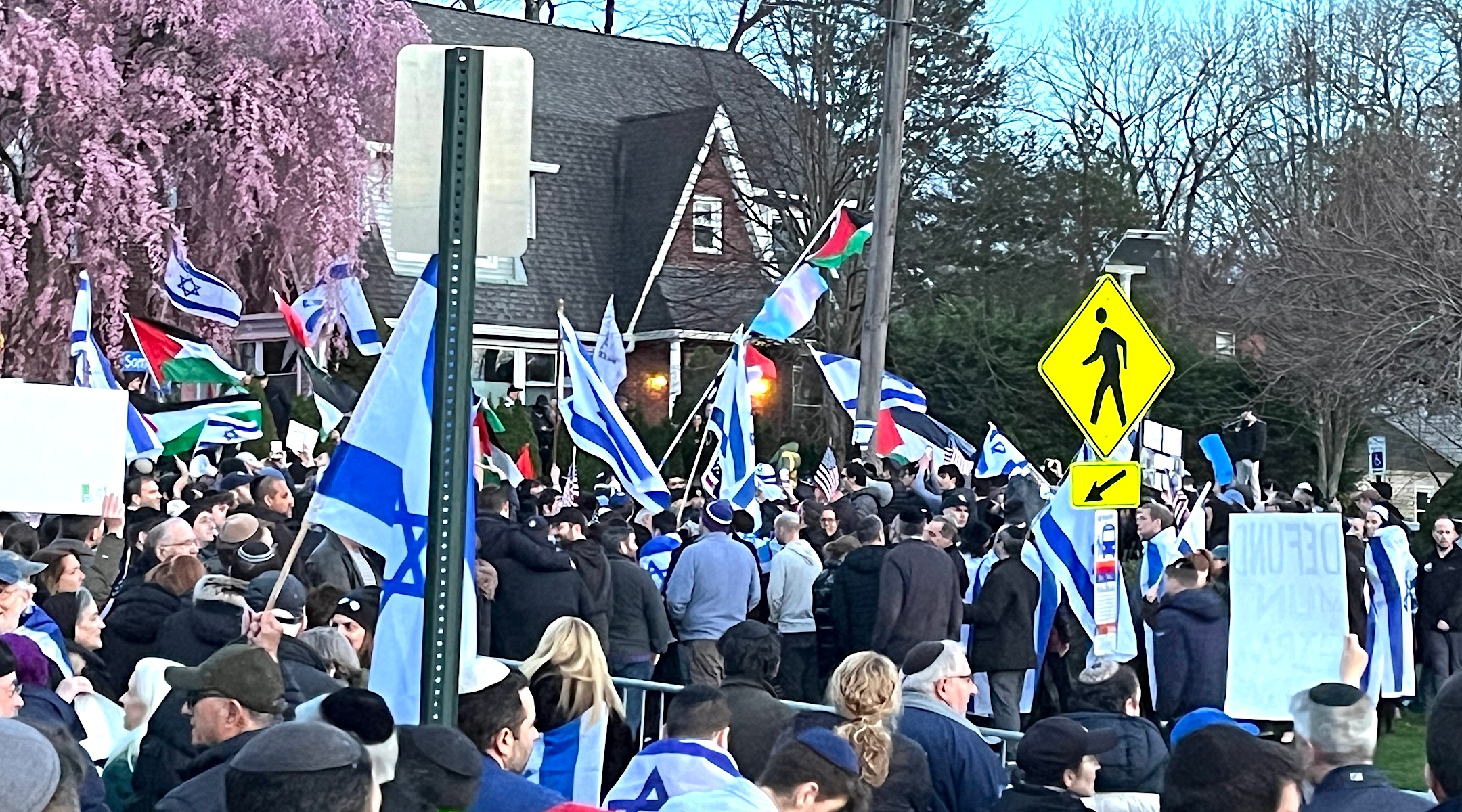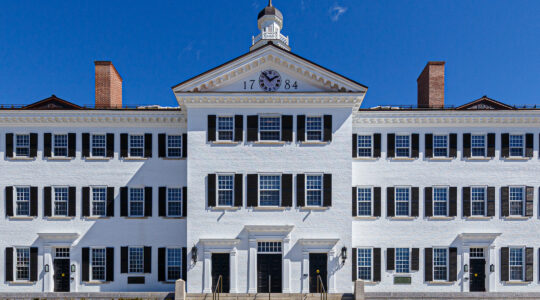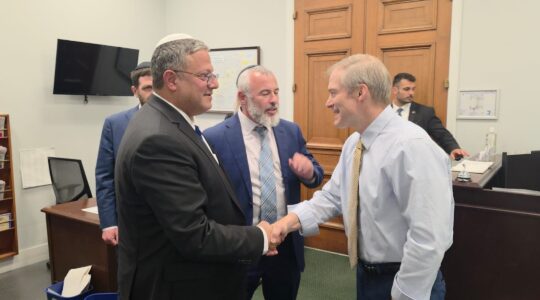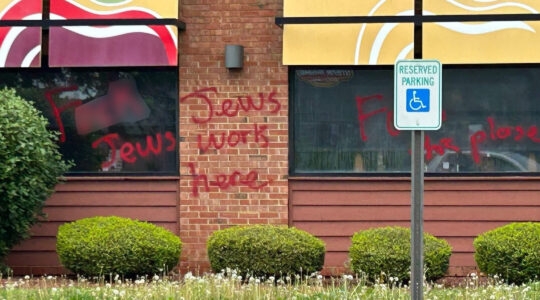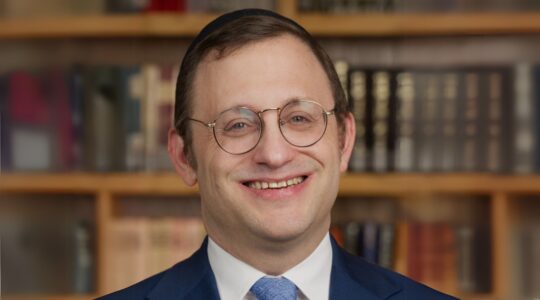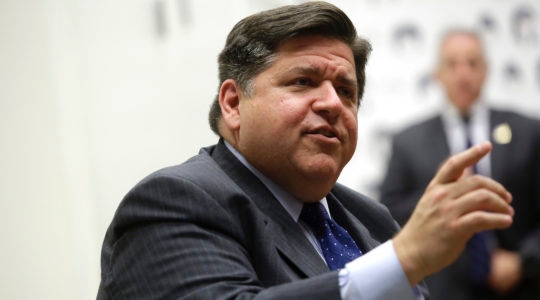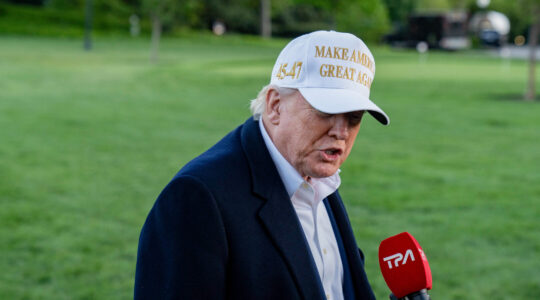(JTA) — Suppose they held a pro-Palestinian protest and no one came?
Or maybe, suppose they held a pro-Palestinian protest and a pro-Israel rally broke out?
That’s pretty much what happened in the very Jewish suburb of Teaneck, New Jersey, on Monday night. For days, the town was on edge after a pair of pro-Palestinian groups — American Muslims for Palestine and Within Our Lifetime — announced plans to picket a fundraiser for the Israeli nonprofit ZAKA, held at one of Teaneck’s 30-odd synagogues.
In Israel, ZAKA is known for racing to the site of terrorist attacks and accidents and collecting the body parts and blood for burial — following a Jewish religious commandment to afford the deceased the dignity and respect they deserve. ZAKA responders showed up at the sites of the deadly Hamas attacks of Oct. 7 and worked there for weeks, reporting brutal scenes of mutilated and burnt bodies and blood-splattered walls.
For Monday’s protesters, ZAKA spread “false claims that fuel Gaza genocide.” Their flyers for the event did not specify what those lies might be, although pro-Palestinian writers have been making much of discrepancies between the eyewitness accounts of some traumatized ZAKA officials and the actual butchery found after an attack that claimed some 1,200 lives.
The event at Congregation Bnai Yeshurun, an Orthodox synagogue, honored Simcha Greiniman, a ZAKA volunteer who gave graphic testimony at United Nations headquarters last year of what he had seen on Oct. 7. As word of the planned protest spread, the Rabbinical Council of Bergen County and the local Jewish Action Committee wrote messages to the community saying they had failed to get local police to cancel the protest. Instead, they would be encouraging a nonviolent counterprotest.
“We will remain peaceful at all times, and act only in a manner which sanctifies the Divine Name for whose sake the kedoshim [revered dead] made the ultimate sacrifice,” a letter read.
Teaneck is no stranger to protests. Exactly a year ago to the day, a group of Jews who opposed the Israeli government’s effort to weaken the judiciary demonstrated when the same synagogue hosted a talk by lawmaker Simcha Rothman, a right-wing architect of the judicial overhaul.
In December, a caravan of some 180 cars drove the 13 miles from Paterson, New Jersey — home to a large Palestinian community — to Teaneck to protest in support of Gaza and Palestinians. The cars rolled up Cedar Lane, the township’s main commercial drag, flying Palestinian flags.
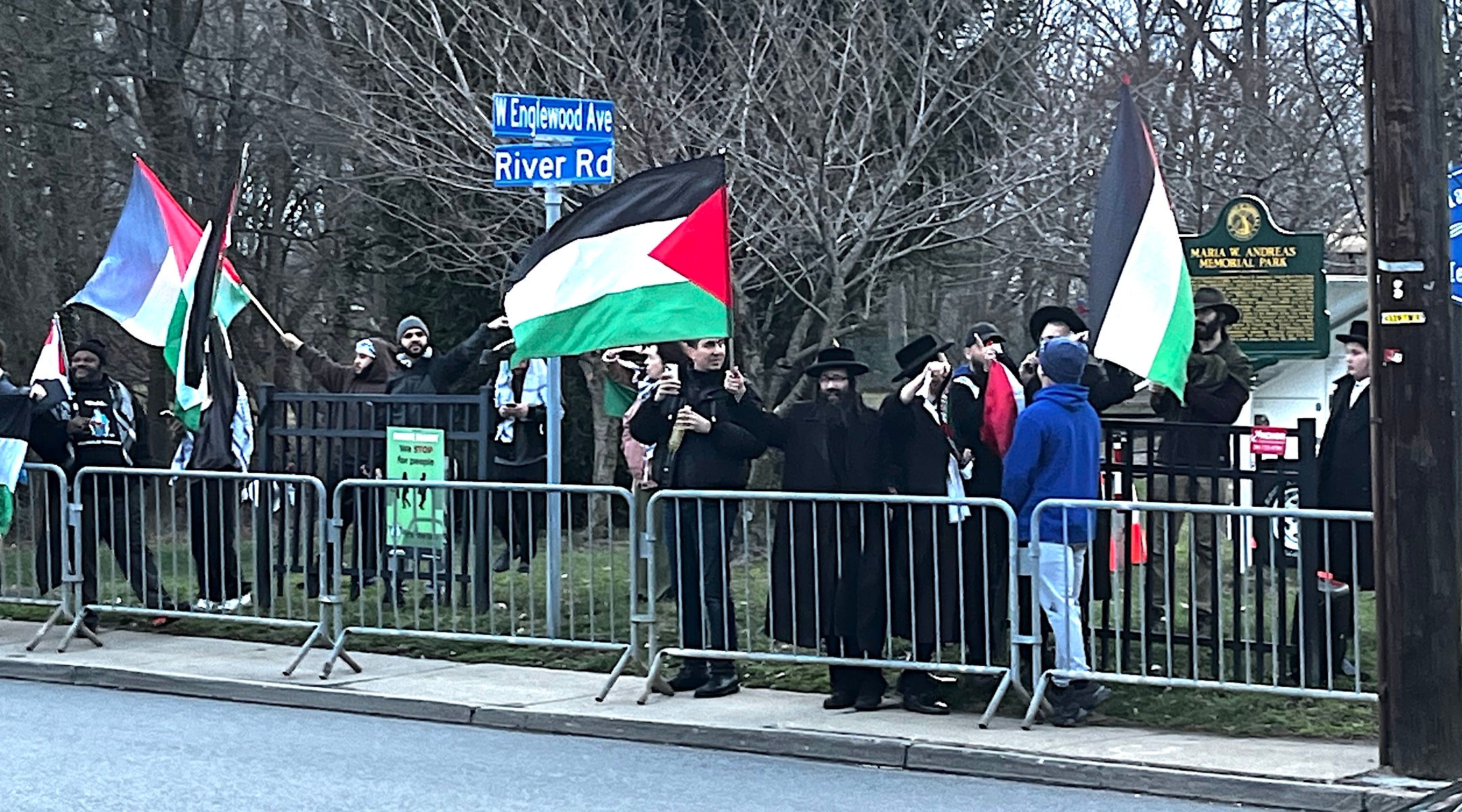
A small group of pro-Palestinian protesters, including members of the Hasidic Neturei Karta sect, were initially confined to a park near a synagogue in Teaneck, New Jersey, April 2, 2024. (JTA photo)
In February, students marched out of Teaneck High School during school hours in a protest for Palestinian rights. The school system now faces a federal investigation over alleged discrimination.
Last month, another Orthodox synagogue in Teaneck, Congregation Keter Torah, sponsored an Israel real estate fair, drawing hundreds of protesters who objected to promoting home sales in the occupied West Bank.
But the messaging coming out of synagogues in the days before Monday’s planned protest reflected particular feelings of frustration and exasperation. If an ostensibly apolitical Israeli first-responder group is the target of anti-Israel protest, what’s next? And if a house of worship is fair game for picketers, are there any safe places left? Just days before, a man shouting antisemitic slurs interrupted a Purim party at another Teaneck synagogue.
That exasperation cut across Jewish denominations.
“We cannot allow others to dishonor the memory of all of those who were killed on October 7 by claiming that the events did not happen,” Rabbi Joel Pitkowsky, rabbi of the town’s sole Conservative synagogue, Congregation Beth Sholom, wrote to his community.
Perhaps that’s why what happened Monday night looked like an emotional release for the local Jewish community, or perhaps a primal scream.
About 90 minutes before the 8 p.m. fundraiser, police had blocked off the streets surrounding the synagogue, and planned to confine the pro-Palestinian protesters behind metal barriers in a park about 200 yards away. Meanwhile, someone at the synagogue had donated two trucks: One blasted Israeli music, and another displayed LED screens reading “Harassing Jews is not a civil right” and “ZAKA retrieves body parts after people are slaughtered by terrorists.”
Then the Jews came — hundreds streaming down what is a main through street of Teaneck, waving Israeli flags, wrapped in Israeli flags, wearing Israeli flags as head scarves. The neighborhood is a Modern Orthodox stronghold — to the degree that it seemed almost redundant when a Manhattan Modern Orthodox congregation, Lincoln Square Synagogue, sent its own busload of counter-protesters.
By the time the pro-Palestinian protesters showed up — I counted 13 — the street scene took on the mood of New York’s annual Celebrate Israel parade. And just like at that parade, perhaps half of the anti-Zionist protesters were black-clad members of the Hasidic Neturei Karta sect.
The thwarted pro-Palestinian protesters, who could barely see the synagogue from the park and beyond the sea of counter-protesters, somehow relocated to a block kitty-corner to the synagogue, and were soon joined by a few dozen others. They were met, behind more metal barriers, by a pro-Israel crowd that if anything was even more intense — and markedly jubilant. At one point women joined hands for a spirited hora while a gaggle of police in riot gear watched from a precautionary distance.
As the street party went on after dark, I found myself wondering if the counterprotest was counterproductive — in that it gave the pro-Palestinian side the kind of attention that any protester craves.
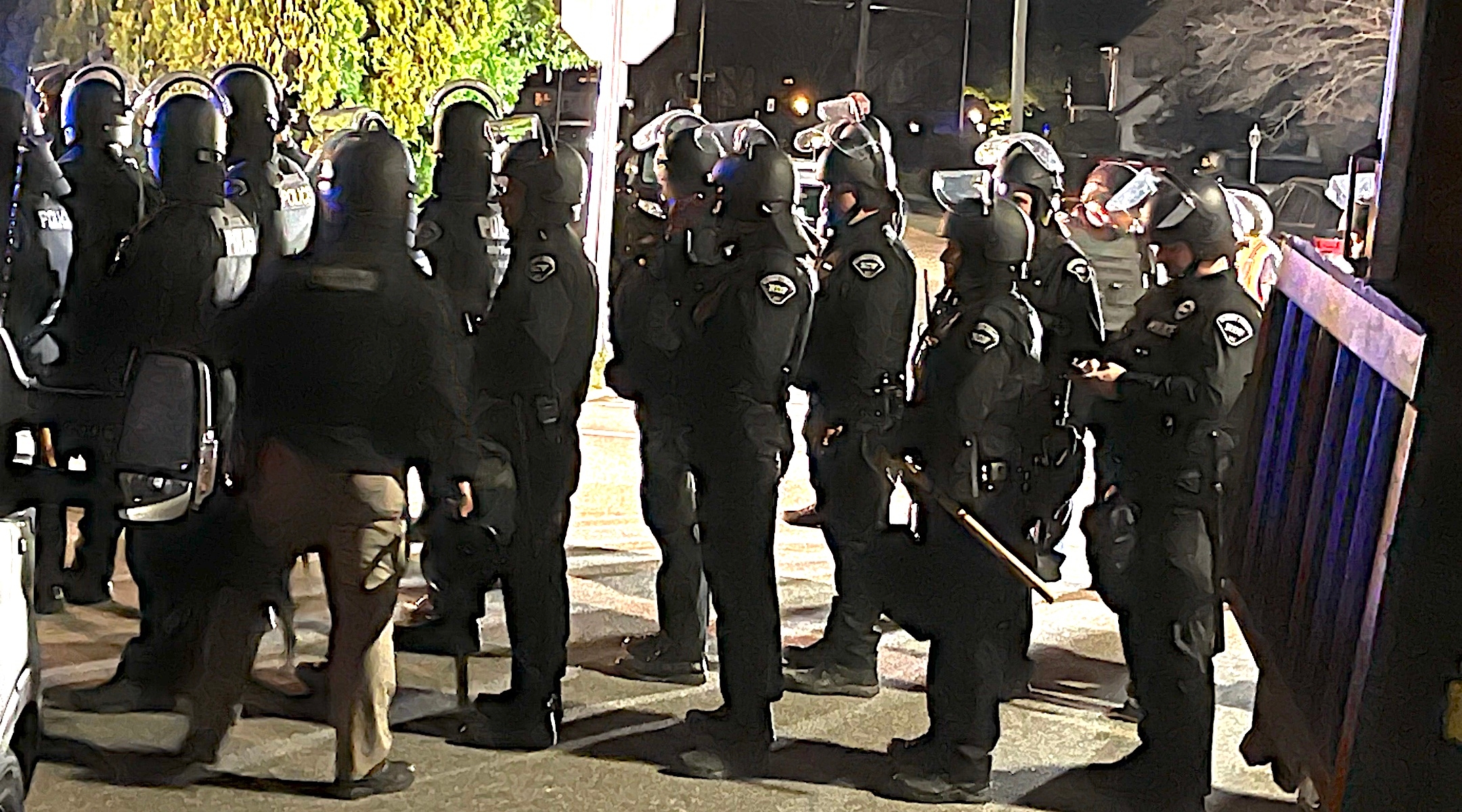
Police in riot gear stood by in case of trouble in Teaneck, New Jersey, as pro-Israel and pro-Palestinian demonstrators faced off in front of a synagogue, April 1, 2024. (JTA photo)
“I don’t care about them. Whether there’s 10 of them or twice as many I don’t care,” said Michael Chernyak, 58, who came from Park Ridge, a suburb 20 minutes away. “I just want to be on the right side.”
Perhaps some people on both sides were itching for a confrontation, and there was some aggressive back and forth across the barriers. But most people kept their cool, and the police did their jobs. As the crowds began to disperse, neighbors stood on their lawns, discussing how a clash in the Middle East had come literally to their front yards.
And while most in this heavily Orthodox neighborhood are deeply engaged with what is happening in Israel and Gaza, some felt Monday’s protest was not just about war and geopolitics. For many, it crossed some sort of line that has been breached in protests across the country — an agreement on what is and isn’t civil when it comes to even deep political divisions.
“I want them to know that the Jewish people can’t be intimidated,” Gila Rachlin, 51, who lives in the neighborhood, told me. “And they should know when they go to a place of worship, where we’re honoring people that are being so helpful to the Jewish people, that has nothing to do with the IDF or politics. There’s nothing that they’re protesting besides [our] being Jewish.”
JTA has documented Jewish history in real-time for over a century. Keep our journalism strong by joining us in supporting independent, award-winning reporting.
